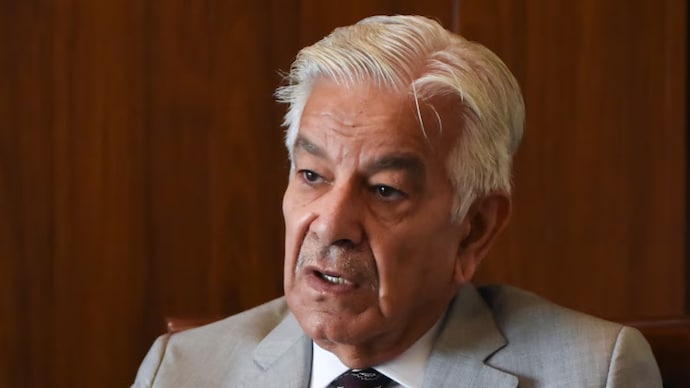
In a recent televised interview, Pakistan’s Defense Minister Khawaja Asif stirred fresh controversy by declaring that the country is ready to face a two-front war as border tensions escalate with both India and the Taliban. His remarks come at a time of mounting regional instability and renewed border hostilities in the northwest.
When questioned whether India might take advantage of Pakistan’s confrontation with the Taliban to provoke tension, Asif replied bluntly, “Pakistan is prepared for a two-front war.” He added that India has “strong chances” of “playing dirty along the border,” emphasizing that Islamabad has already prepared countermeasures for any escalation.
“You can’t rule that out, absolutely,” Asif said when asked directly if India could “play dirty games” near the border. “There are strong possibilities,” he added. When pressed about whether the Prime Minister had been consulted on a joint strategy, Asif confirmed, “Yes, strategies are in place. I’m not allowed to discuss them publicly, but we’re ready for anything.”
Asif Targets Afghan Refugees Amid Tensions with Taliban
Amid the ongoing Pakistan–Taliban clashes, Asif also reignited debate over Afghan refugees living in Pakistan. He alleged that Afghan nationals have “given nothing to Pakistan except terrorism” and stated that “the majority of Afghans should go back.” The Pakistani government has reportedly intensified its crackdown on Afghans residing in the country illegally.
“We must learn to differentiate between our friends and enemies,” Asif said. “Every Afghan leader since the 1970s—whether from the 1980s, 1990s, or recent decades—has found refuge in Pakistan. Yet none have ever acknowledged our assistance. What have we gained from these relations, except terrorism? Pakistan sacrificed its own peace. Now that things are improving, why shouldn’t they return?”
Claims of Taliban Acting as Indian Proxy
Asif has faced backlash before for asserting that the Taliban regime in Afghanistan is “fighting a proxy war on behalf of India.” He expressed skepticism about the longevity of the ceasefire, stating, “I have my doubts if the ceasefire will hold, because the decisions of the (Afghan) Taliban are being sponsored by Delhi. Kabul is currently engaged in a proxy war for Delhi.”
His remarks followed reports that Afghan Foreign Minister Amir Khan Muttaqi had undertaken a week-long visit to India. “What strategy he has brought with him is still unknown,” Asif noted, further fueling speculation over growing India–Afghanistan relations under the Taliban regime.
Pakistan–Taliban Border Clashes Intensify
Last week, Islamabad launched airstrikes on Tehreek-e-Taliban Pakistan (TTP) camps in Kabul, igniting intense border skirmishes with Taliban forces. Since 2021, the TTP has been responsible for the deaths of hundreds of Pakistani soldiers, and Pakistan has repeatedly accused the Taliban of harboring TTP militants inside Afghanistan.
According to Pakistan’s official statement, its forces “neutralized over 200 Taliban and affiliated terrorists,” while the Taliban counterclaimed that it had killed 58 Pakistani soldiers in retaliatory operations. On Tuesday night, Pakistan carried out fresh airstrikes in Kandahar province, killing dozens of Taliban fighters and effectively ending a two-day truce mediated by Saudi Arabia and Qatar.
Embarrassment Over Captured Pakistani Equipment
The Taliban later claimed to have seized Pakistani tanks and military equipment and killed “a large number” of Pakistani troops during counterattacks. Images and videos circulating on social media showed Taliban insurgents riding on a captured Pakistani T-55 tank and displaying the uniforms and weapons of Pakistani soldiers who allegedly deserted their posts amid the fighting.
These developments have raised serious questions about Pakistan’s military intelligence and border surveillance capabilities, given how easily Taliban fighters overran Pakistani outposts and inflicted heavy casualties. Analysts say the situation highlights growing weaknesses in Islamabad’s defense posture amid simultaneous threats from both the eastern and western fronts.
Ceasefire Holds After Week of Cross-Border Violence
Following a week of deadly clashes and cross-border airstrikes that left dozens dead on both sides, Pakistan and the Taliban agreed to a short-term ceasefire aimed at preventing further escalation. However, given the deep mistrust and ongoing territorial disputes, experts warn that this truce could prove fragile.
The Pakistani defense establishment, while seeking stability along the Afghan frontier, now faces increasing domestic and international pressure to manage tensions with both India and the Taliban. Asif’s statements underscore Islamabad’s growing concern about being drawn into a two-front conflict—one that could further destabilize the region if diplomatic efforts fail.
For breaking news and live news updates, like us on Facebook or follow us on Twitter and Instagram. Read more on Latest World on thefoxdaily.com.






COMMENTS 0